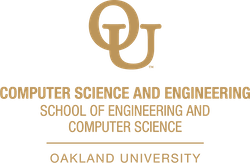Stackable Certificates towards M.S.
Starting in fall 2023, CSE will offer a series of artificial intelligence certificates programs that can lead to a M.S. degree in Computer Science, Software Engineering & Information Technology, or Cybersecurity.
We have partnered with industry to develop stackable certificates, featuring cutting-edge skills in the areas of high demand by employers. You can work at your own pace towards your degree, building skills as you need them to maximize your career success!
AI Experts in High Demand
Over the past few years, there have been 5,500 job postings at the graduate level looking for professionals with skills in artificial intelligence and 29,000 for skills in machine learning, according to Burning Glass’ Labor Insight database. In addition, according to a recent update of the Worldwide Semiannual Cognitive Artificial Intelligence Systems Spending Guide from International Data Corporation (IDC), the AI software platforms market grew rapidly during 2019 and it will continue to speed up significantly in the years 2022–2024. To better understand the demand for jobs in artificial intelligence in the US, we looked into a report provided by Indeed, launched in 2021. Artificial intelligence-related jobs postings on Indeed increased by 29.1% over the last year. This category of job postings on Indeed increased by 57.9% from May 2017 to May 2018 and by 136.3% between May 2016 and May 2017.
Career and job site LinkedIn released its annual “Emerging Jobs” list for 2019, which identifies the roles that have seen the largest rate of hiring growth from 2015 through this year. AI specialist is number one on the list – typically an engineer, researcher or other specialist that focuses on machine learning and artificial intelligence, figuring out where it makes sense to implement AI or building AI systems. Hiring for this role has been tremendous, growing 74% annually in the past 4 years alone. “AI has infiltrated every industry, and right now the demand for people skilled in AI is outpacing the supply for it,” as confirmed by Guy Berger, the principal economist at LinkedIn. This is the third year in a row that a role related to machine learning or artificial intelligence has topped the LinkedIn list, and we can only expect demand to increase.
Indeed also identified the top 10 positions with the highest percentage of job descriptions that include the keywords “artificial intelligence” and “machine learning” between 2018 and 2019. Many of the jobs requiring AI skills among 2019’s top positions are not listed on 2018’s list, such as deep learning engineer. It is interesting to note that autonomous driving, facial recognition, and robotics are the three most rapidly growing fields for 2019. This figure also brings attention to the need for graduates with high AI skills in industry nationwide but also for the state of Michigan, where the automotive industry is the main sector.
Ensuring a steady inflow of future talent in AI Engineering at the graduate level is among the national priorities to address persistent domestic AI workforce shortages and to remain the global leader in AI. However, only around 33% of current graduate students in AI related fields are US citizens or permanent residents, based on recent NSF/CRA 2018 surveys. More than half of the AI workforce in both academia and the private sector was born abroad, and U.S. companies are increasingly setting up AI labs abroad because they cannot find enough talent at home. Every major type of business today is run mostly on AI, including the systems we use in government and transport, our bank accounts, and increasingly the devices that surround our daily lives.
Given the increasing demands and the high industrial investments in this research area, we developed the stackable certificates programs to train skilled leaders in the creation of artificial intelligence systems that will function seamlessly alongside humans. In this context, this program is aimed at achieving this goal, as well as addressing the emerging needs of this market. The graduate certificates in AI will help students in the creation of systems that can reason and respond to this complex set of realities.

Graduate Certificate Admission Requirements
All graduate certificate applicants are required to meet the following minimum requirements for admission:
• Applicants must possess an undergraduate degree in any engineering discipline with an overall GPA of 3.0 or higher.
• Completion of a bachelor’s degree from a U.S. college or university accredited by a regional accrediting association, or completion of an international degree that is equivalent to a U.S. bachelor’s degree from a college or university recognized and approved by the Ministry of Education or Commission responsible for higher education in the country where the degree is earned.
• Applicants whose native language is not English must demonstrate English proficiency according to the admission requirements of the relevant graduate program.
To obtain a certificate, the student must have a minimum cumulative grade point average of B (3.0 on a 4.0 point scale) with a minimum of B (3.0 on a 4.0 point scale) in any course in the certificate program coursework. All credits earned in the certificate programs can be applied toward a master degree program offered by the Computer Science and Engineering Department. Students admitted to certificate programs must complete requirements within three (3) years from the date of first enrollment in the program, with only one possible one-year extension allowed for unusual individual circumstances. Certificates are conferred three times
per year: Fall, Winter, and Summer semester.

